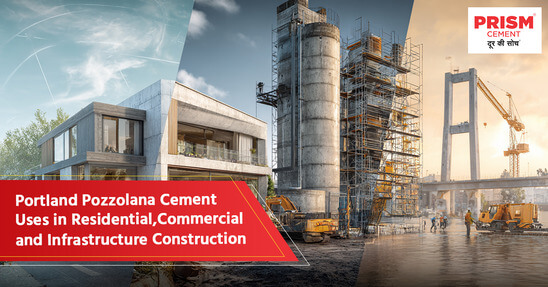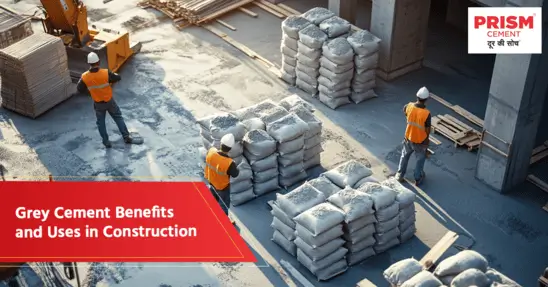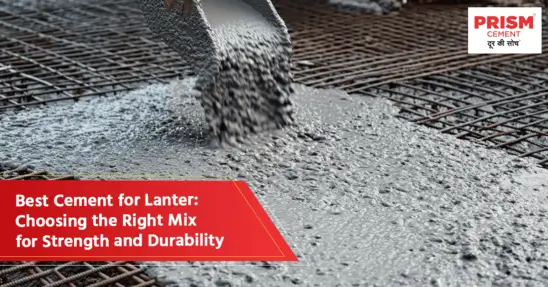Uses of Portland Pozzolana Cement (PPC) range from a vast majority of construction projects, thus being a highly sought-after material within the industry. Its widespread suitability lends itself to its use in residential, commercial and infrastructure construction. This blog discusses various PPC uses and advantages in contemporary construction.
Portland Pozzolana Cement
PPC is a blended Portland cement made by grinding Portland clinker along with pozzolanic components, such as fly ash, volcanic ash or calcined clay. This mixture provides additional properties to the cement so that it can become stronger as well as stronger in resisting any kind of environment.
Uses of PPC in Residential Buildings
- Multi-purpose home application: PPC is commonly used in foundations, walls and slabs due to durability.
- Vigorous structural support: Offers a strong and durable foundation for houses.
- Perfect for plastering: Provides smooth surfaces for walls and ceilings.
- Production of cement blocks: Used in producing lasting cement blocks for homes.
Applications of PPC in Commercial Building
- Strong construction needs: Commercial structures need robust and sturdy materials
- PPC for durability: Provides enhanced strength and chemical resistance
- Broad uses: Applied in shopping malls, high-rise buildings and office buildings
- Use of cement flooring: Offers a solid, flat surface for business floors
- Versatile material: Adaptable to both structural and non-structural uses
Applications of PPC in Infrastructure Development
- Durability materials: Roads, dams and bridges need strong building materials
- PPC in infrastructure: Commonly used because of its durability and strength
- Environmental resistance: Capable of withstanding extreme conditions and chemical exposure.
- Marine applications: Perfect for marine structures because of resistance to sulfate and chloride.
- Sustainable structures: Increases longevity and strength in building materials.
Benefits of Applying PPC in Construction
- Increased durability: Pozzolanic reaction decreases permeability, thereby enhancing resistance to water and chemicals.
- Reduced heat generation: Generates less heat of hydration, thus reducing thermal cracking.
- Enhanced workability: Simpler to place and compact for effective building.
Challenges and Considerations When Using PPC
- Proper curing required: Necessary for optimal pozzolanic reaction and attainment of desired strength.
- Increased setting time: The initial setting will take longer than normal Portland cement.
- Material selection: A stringent selection of pozzolanic materials ensures regular quality.
- Accurate mixing ratios: Exact measurements are important to ensure performance specifications.
Conclusion
Applications of Portland Pozzolana Cement are varied and significant in multiple construction industries. Its improved durability, better workability, and protection against environmental conditions make it the first choice for housing, commercial and infrastructure developments. By knowing its characteristics and uses, architects can benefit from the advantages of PPC to build strong and long-standing buildings.
FAQs
Q1. Why is Portland Pozzolana Cement (PPC) distinct from Ordinary Portland Cement (OPC)?
Answer: PPC is a type of cement manufactured by grinding Portland clinker with pozzolana materials, while OPC consists largely of Portland clinker. This mixing increases the endurance and strength of PPC over OPC.
Q2. Why is PPC cement used in the construction of dwellings?
Answer: PPC is favoured for residential construction because it can offer a durable and robust structure, and because it is applicable for plastering cement and manufacturing cement blocks.
Q3. How does PPC cement make commercial and infrastructure projects more durable?
Answer: PPC makes buildings more durable through the reduction of concrete permeability and its improvement in chemical attack resistance, and thus it is best suited for high-stress commercial and infrastructure applications.
Q4. Does Portland Pozzolana Cement appropriate for waterproofing and marine structures?
Answer: Yes, PPC is appropriate for waterproofing and marine structures because it is resistant to sulfate and chloride attacks, which are prevalent in such conditions.
Q5. What are the environmental advantages of utilizing PPC cement in construction?
Answer: Utilizing PPC decreases the carbon footprint of cement manufacturing as it uses pozzolanic materials such as fly ash, which are industrial waste products.


.webp)

